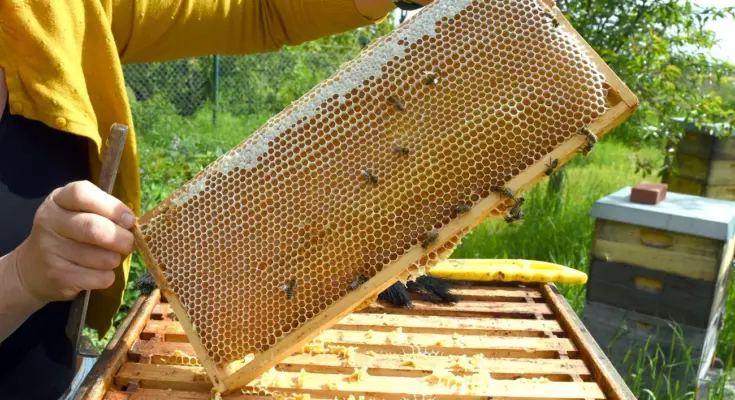German beekeepers have harvested unusually large quantities of honey this year. An average of 37.5 kilograms of honey was collected per bee colony, 5.9 kilograms more than in 2024, said the specialist center for bees and apiculture in Mayen. This value is the highest harvest value in statistics starting in 2011. This value is based on two surveys regarding early and summer production, namely two harvests a year. This year, beekeepers in Germany took part with a total of 13,377 requests to speak. Compared to the rainy year 2024, this year the increase is 5.6 kilograms.
According to information, the price of a 500 gram jar of flower honey has increased by around three percent to around 6.60 euros. “Given the high costs, this amount is a moderate increase,” said the head of the specialist center, Christoph Otten. Beekeepers must cover costs such as glasses, mite treatment, fuel and feed; Bees are given a type of sugar water that they eat as a substitute for honey. Honey prices vary widely; in big cities and metropolitan areas the price is more expensive than in rural areas. On the other hand, varietal honey is more expensive than flower honey.
Ideal weather for bees
The reason for the high harvest this year is that the weather is sunny and at the same time humid enough so that the plants can grow and flower well, which means the bees find a lot of nectar. “Because of the weather, there are ideal bee gathering conditions in many areas,” says bee expert Otten. However, there are regional differences – although yields are high in the Rhineland, in southern Germany they are rather moderate.
It is estimated that there are 1.2 million honey bee colonies in Germany. According to the German Beekeepers Association, their production accounts for only about half of honey consumption in Germany; the rest is imported from EU countries such as Romania and from other countries such as Argentina and China. Every year, a German citizen consumes about a kilo of honey, either as a spread on bread or as an ingredient in salad dressings and other dishes.
By the way, most beekeepers do this in their free time; there are only a few professional beekeepers. German honey is sold mainly at weekly markets, on doorsteps.
© dpa-infocom, dpa:251122-930-325340/1



